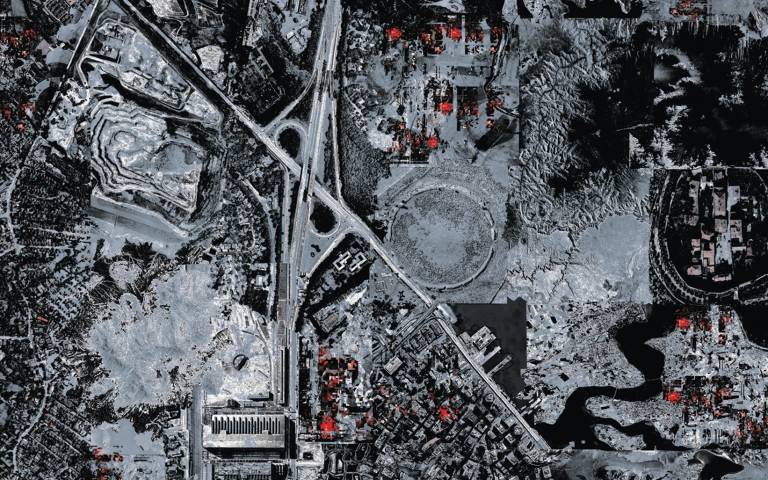B-Pro Prospectives Lecture Series Spring 2022
19 May 2022, 2:00 pm–3:00 pm

A B-Pro History and Theory lecture series, highly recommended for Architectural Design, Urban Design and Architectural Computation students as well as interested professionals.
This event is free.
Event Information
Open to
- All
Availability
- Yes
Cost
- Free
Organiser
-
Roberto Bottazzi
About
The B-Pro Prospectives History and Theory Lecture Series offers a platform for presentation, discussion and theoretical reflection upon the links between digital thought, architecture, and urban design. This year's series of talks emphasise the key role computation plays within complex design synthesis and their cultural implications.
This series encourages and inspires the current student body and interested professionals, by creating conversations about topics addressing academia, practice and beyond as well as overall disciplinary concerns and frontiers.
B-Pro, or Bartlett Prospective, groups together five of the school's graduate programmes with a unique philosophy and shared approach to the future of design, architecture and the urban environment. The B-Pro Prospectives lecture series is organised by Roberto Bottazzi and Emmanouil Zaroukas.
For this term's series, all events will be held in Zoom. Check the schedule for individual registration links to each event.
Schedule
- 9 March | 13:00 | Daniel Cardoso Llach
Rethinking AI in Architecture
'Artificial intelligence' discourse overwhelmingly represents a world that has been emptied of life: a field for automated data harvesting, analysis, and inference that renders human experience not as irreducibly open ended and contingent but as a site for labor and knowledge extraction — as a subject of managerial optimization. From Amazon warehouses to Smart City playscapes, such closed loop visions mobilize increasingly infrastructural computer vision and machine learning techniques with the aim of surveilling and computing with all kinds of citizen and worker behavior. Drawing both from recent historical and sociotechnical scholarship on AI, and from our lab's experimental work towards situated approaches to machine learning and AI in design and construction, this talk will explore the following question: What can architectural modes of inquiry and creativity do to illuminate, challenge, or subvert these logics?
Biography
Daniel Cardoso Llach is Associate Professor of Architecture at Carnegie Mellon University, where he chairs the Master of Science in Computational Design and co-directs CodeLab. He is the author of publications, exhibitions, and technologies critically exploring the nexus of design and computation. His work has been supported by the Graham Foundation, Canada’s Social Science and Humanities Research Council, Google’s Artists + Machine Intelligence program, among others, and is a 2021-22 Pennsylvania Manufacturing Fellow. Daniel holds a Ph.D. and a MS from MIT and a B. Arch. from Universidad de los Andes in his native Bogotá.
His publications include the book Builders of the Vision: Software and the Imagination of Design, a history of CAD which identifies and documents a technological imaginary of design emerging from postwar technology research (and its architectural repercussions); the co-edited special issue Other Computations: Technologies for Design and Architecture from the Global South; and the forthcoming co-authored book Designing the Computational Image, Imagining Computational Design, among others. He is also founding co-editor of the “Design, Technology, and Society” Routledge book series, and of the web platform lattice.space, both of which foster critical perspectives at the crossroads of design, technology, and society.
- POSTPONED 19 May | 14:00 | Jeffrey Huang
Due to unforseen circumstances this lecture is now postponed until the Autumn term. New date to follow.
Artificial Design
With the increasing pressure to cope with the speed and scope of rapid urbanization, a human-machine collective intelligence approach to architectural and urban design, that does not rely solely on the bounded rationality and capacity of humans, seems inevitable. Humans on their own may still design a few selected iconic and boutique buildings, but most architectural and urban design tasks may benefit from being handled “artificially” in order to respond to the challenges of rapid urbanization and ecological urgency, and to generate culturally resilient architectural and urban solutions that are sensitive to the unique features of individual localities.
In this presentation, Jeffrey Huang will discuss ongoing work conducted at the EPFL Media x Design Lab, aimed at examining the possibility of “artificial design.” The research is predicated on the belief that in order to artificialize the architectural and urban design process, some groundwork will be necessary, especially with regard to the definition of a human-machine work flow that can constitute the kernel of a future, semi- or fully artificial design and urbanism agency, sensitive to some of the essential attributes of design creativity: ambiguity, anonymity, anomaly. To illustrate this approach, Jeffrey will highlight three recent projects that investigate the use of collective human-machine intelligence — e.g. Generative Adversarial Networks (GANs) and Natural Language Processing (NLP) — at different scales in architectural and urban design: Artificial Swissness (the primitive hut), Artificial Zurichness (urban housing) and Artificial Gangnamness (the superblock).
Biography
Jeffrey Huang is the Director of the Institute of Architecture at EPFL in Switzerland where he is also a Full Professor and Head of the Media x Design Lab. He holds a DiplArch from ETH Zurich, and Master’s and Doctoral degrees from Harvard’s Graduate School of Design (GSD). Prior to EPFL, he was a faculty member at the GSD. He was also a Visiting Professor at Tsinghua University, a Visiting Fellow at Stanford University’s d.school, and a Berkman Fellow and Faculty Associate at Harvard University’s Berkman Klein Center for Internet and Society. From 2013-16, he was the founding Head of the Architecture and Sustainable Design Pillar (Dean) at SUTD in Singapore. His research examines the convergence of physical and digital architecture. His recent work on GAN + Architecture is featured in the current TAD issue on Intelligence, and was exhibited at the 2021 Seoul Biennale for Architecture and Urbanism.
Image: Compressed Landscape, from 'Beyond the Grid: Territories of Resolution', by Carolina Safieddine, Jiahua Dong, Kun Luo and Yandong Liu, Urban Design MArch, RC19, 2021
 Close
Close

